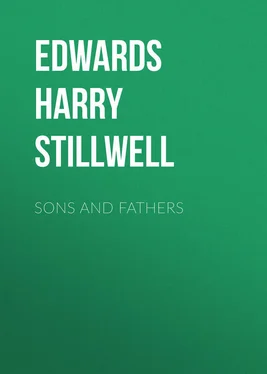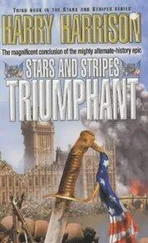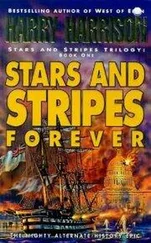Harry Edwards - Sons and Fathers
Здесь есть возможность читать онлайн «Harry Edwards - Sons and Fathers» — ознакомительный отрывок электронной книги совершенно бесплатно, а после прочтения отрывка купить полную версию. В некоторых случаях можно слушать аудио, скачать через торрент в формате fb2 и присутствует краткое содержание. Жанр: foreign_antique, foreign_prose, на английском языке. Описание произведения, (предисловие) а так же отзывы посетителей доступны на портале библиотеки ЛибКат.
- Название:Sons and Fathers
- Автор:
- Жанр:
- Год:неизвестен
- ISBN:нет данных
- Рейтинг книги:5 / 5. Голосов: 1
-
Избранное:Добавить в избранное
- Отзывы:
-
Ваша оценка:
- 100
- 1
- 2
- 3
- 4
- 5
Sons and Fathers: краткое содержание, описание и аннотация
Предлагаем к чтению аннотацию, описание, краткое содержание или предисловие (зависит от того, что написал сам автор книги «Sons and Fathers»). Если вы не нашли необходимую информацию о книге — напишите в комментариях, мы постараемся отыскать её.
Sons and Fathers — читать онлайн ознакомительный отрывок
Ниже представлен текст книги, разбитый по страницам. Система сохранения места последней прочитанной страницы, позволяет с удобством читать онлайн бесплатно книгу «Sons and Fathers», без необходимости каждый раз заново искать на чём Вы остановились. Поставьте закладку, и сможете в любой момент перейти на страницу, на которой закончили чтение.
Интервал:
Закладка:
"I will read the papers," he said, gently; "they will tell me all." Taking this as a dismissal the woman withdrew.
CHAPTER VI
"WHO SAYS THERE CAN BE A 'TOO LATE' FOR THE IMMORTAL MIND?"
Something like fear, a superstitious fear, arose in Edwards' heart as he turned down the lid of the old-fashioned desk in the little room upstairs and saw the few papers pigeon-holed there with lawyer-like precision. On the top lay a long envelope sealed and bearing his name. His hand shook as he held it and studied the chirography. The moment was one to which he had looked forward for a lifetime and should contain the explanation of the singular mystery that had environed him from infancy.
As he held the letter, hesitating over the final act, his life passed in review as, it is said, do the lives of drowning persons. The thought that Edward Morgan was dying came in that connection. The orphan, the lonely college boy, the wandering youth, the bohemian of a dozen continental capitals, the musician and half-way metaphysicist and theosophist, the unformed man of an unformed age, new sphere, one of quick, earnest, feverish action, the new man, was to spring armed, or hampered by – what? At that moment, by a strange revulsion, the life that he had worn so hardly, so bitterly, even its sadness seemed dear and beautiful. After all it had been a life of ease and many scenes. It had no responsibilities – now it would pass! He tore open the envelope impatiently and read:
"Edward Morgan – Sir: When this letter comes to your knowledge you will have been acquainted with the fact that my will has made you heir to all my property, without legacy or restriction. That document was made brief and simple, partly to avoid complications, and partly to conceal facts with which the public has no reasonable interest. I now, assured of your character in every particular, desire that you retain during the lifetime of Gerald Morgan the residence which has always been his home, providing for his wants and pleasures freely as I have done and leaving him undisturbed in the manner of his life. I direct, further, that you extend the same care and kindness to Rita Morgan, my housekeeper, seeing that she is not disturbed in her home and the manner of her life. My object is to guard the welfare of the only people intimately connected with me by ties of friendship and association, whom I have not already provided for. Carrying out this intention, you will as soon as possible, after coming into possession, take precautions looking to the future of Gerald Morgan and Rita Morgan, my housekeeper, in the event of your own death; and the plan to be selected in this connection I leave to your own good sense and judgment, only suggesting as adviser for you Ellison Eldridge, one of the few lawyers living whose heart is outside of his pocketbook, and whose discretion is perfect.
"John Morgan."That was all.
The young man, dumfounded, turned over the single sheet of paper that contained the whole message, examined again the envelope, read and reread the communication, and finally laid it aside. Not one word of explanation of his own (Edward's) existence no claim of relationship, no message of sympathy, only the curt voice of an eccentric old man, echoing beyond the black wall of mystery and already sunk into eternal silence. The old life no longer seemed dear or beautiful. It returned upon him with the dull weight of oppression he had known so long. It was a bitter ending, a crushing, overwhelming disappointment.
He smiled at length and lighted another cigar. His mind reverted to the singular character whose final expression lay upon the desk. His last act had been to guard against the curious, and that had included the beneficiary. He had succeeded in living a mystery, in dying a mystery, and in covering up his past with a mystery.
"It was well done." Such was Edward's reflection spoken aloud. He recalled the lines: "I now, assured of your character in every particular." Every word in that laconic letter, as also every word in the few communications made to him in life by this man, meant something. What did these mean? "Assured" by whom? Who had spied upon his actions and kept watch over him to such an extent as would justify the sweeping confidences? But he knew that the testator had read him right. A faint wave of pleasure flushed his cheek and warmed his heart when he realized the full significance of this tribute to his true character. He no longer felt like an intruder.
And yet, "assured" by whom? And who was Gerald Morgan? Not a relative or he would have said so; he would have said "my nephew, Gerald Morgan." The same argument shut him (Edward) out. Why this suspicious absence of relationship terms? – and they, both of them, Morgans and heirs to his wealth?
Again he dragged the papers from the desk and ran them over. Manuscripts all, they contained detached accounts of widely separated people and incidents, and moreover they were clearly briefed. "A Dramatic Trail," "The Storm," "A Midnight Struggle," etc. They had no bearing upon his life; they were the unpublished literary remains of John Morgan.
Every paper lay exposed; the mine was exhausted. He again read the letter slowly, idly lifted each paper and returned all to the desk.
The cigar was out again; he tossed it from the window, locked the desk and passed into the mother's room. The action was without forethought, but his new philosophy had taught him the value of instinctive human actions as index fingers. What cause then had drawn him into that long-deserted room? As he reflected, his eyes rested upon the picture of the girl in the little frame on the mantel. He started back, amazed and overwhelmed. It was the face that had been turned to him in the library – the face of Gerald Morgan!
Edward was surprised to find himself standing by the open window when he had exhausted the train of thought that the recognition put in motion, and counting his heart-beats, ninety to the minute. By that curious power or weakness of certain minds his thoughts ran entirely from the matter in hand along the lines of a lecture his friend Virdow as Jean had delivered, the theory of which was that organic heart disease, unless fastened to its victim by inheritance, is always a mental result. If a mere thought or combination of thoughts could excite, a thought could depress. It was plain; he would write to Virdow confirming his theory.
Then he became conscious that the moon hung like a plate of silver in the vast sky space of the east and that her light was flashed back by many little points in the city beneath him – a gilt ball, a vane, a set of window glasses, and the dew-wet slates of a modern roof. One white spot was visible in the yard in front, white and pale as the moon when the vapor had dispersed but set immovably. As he idly sought to unravel its little secret, it simply became a part of the shadow and invisible, but he felt that some one was looking up at him; and suddenly he saw the slender figure of a man pass, cross the gravel walk and vanish in the shrubbery on the left.
Edward did not cry out; he stood musing upon the fact, and lo, there came a glitter of rosy light along the horizon; the moon had vanished overhead, and sound arose in confused murmurs from the dull heaps of houses in the valley. He saw again at the moment, over the eastern hills, the face of a girl as she stood calling her pets, and felt her eyes upon him.
When he awoke that day he found the sun far beyond the zenith and he lay revolving in his mind the events of the night; to his surprise much of the weight was gone and in its place was interest, the like of which he had never before known. An object in life had suddenly been developed and instinctively he felt that the study of this new mystery would lead to a knowledge of himself and his past.
The first thing to be done was to again see the stranger who had invaded his library, and carry his investigation as far as this person would permit. This in mind, he dressed himself with care and descended into the dining-room. In a few moments his breakfast was served. Upon hearing his inquiry for Rita, Ben, the butler, retired and presently the woman, grave, and after a few words quiet, took his place. Before speaking Edward noticed her closely again. About fifty years of age, perhaps less, she stood as erect and rigid as an Indian, her black hair without a kink. There was an easy dignity in her attitude, hardly the pose of a slave, or one who had been. But in her face was the sadness of personal suffering, and in her voice a tone he had noticed at first, an echo of some depressing experience, it seemed to him.
Читать дальшеИнтервал:
Закладка:
Похожие книги на «Sons and Fathers»
Представляем Вашему вниманию похожие книги на «Sons and Fathers» списком для выбора. Мы отобрали схожую по названию и смыслу литературу в надежде предоставить читателям больше вариантов отыскать новые, интересные, ещё непрочитанные произведения.
Обсуждение, отзывы о книге «Sons and Fathers» и просто собственные мнения читателей. Оставьте ваши комментарии, напишите, что Вы думаете о произведении, его смысле или главных героях. Укажите что конкретно понравилось, а что нет, и почему Вы так считаете.












